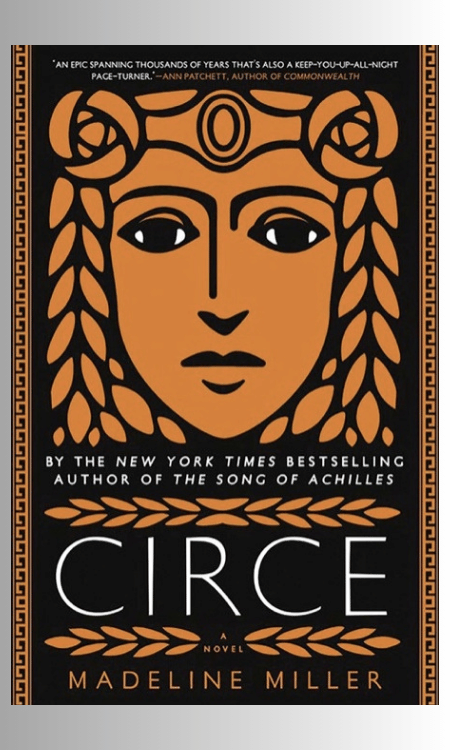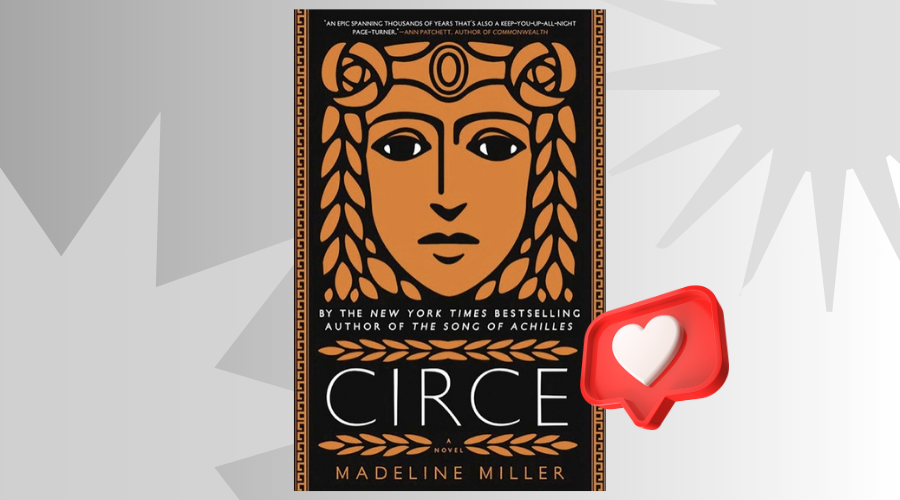Circe by Madeline Miller is a captivating retelling of the Greek myth of Circe, the powerful enchantress from The Odyssey. Told from Circe’s own perspective, the novel explores her transformation from a lonely, misunderstood daughter of the gods to a fierce and independent woman who carves her own path. As Circe learns the art of magic and navigates her relationships with gods, mortals, and monsters, the story delves into themes of power, love, and identity, all while challenging the roles women are often forced into. It’s a beautifully written exploration of self-discovery and empowerment.

| Author | Madeline Miller |
| Publication date | April 10, 2018 |
| Goodreads Rating | 4,23 |
| Page count | 393 pages |
| Topics | Fantasy, Fiction, Mythology, Historical Fiction, Greek Mythology, Retellings, Historical, Adult, Romance |
Circe Book Summary
Circe by Madeline Miller is a richly layered retelling of the Greek myth of Circe, the enchantress who appears in The Odyssey. The novel reimagines her life, giving voice to a character who has often been viewed as a mere villain or minor figure in traditional mythology. The story begins with Circe’s childhood in the world of the gods, where she is the overlooked daughter of Helios, the sun god. Unlike her powerful and radiant family, Circe feels isolated and powerless, marked by her plainness and inability to fit in with the divine beings around her. Her uniqueness sets her apart, and she is often dismissed or ridiculed by her family.
One day, Circe discovers she has the power to transform mortals into animals. This ability marks her as dangerous in the eyes of the gods, leading to her banishment to the remote island of Aiaia. There, Circe is free to explore her magical talents and develop her powers, which include potion-making and the art of enchantment. She spends centuries on Aiaia, growing stronger, wiser, and more self-assured. Despite her solitude, she is not entirely cut off from the outside world. Over the years, she encounters various famous figures from Greek mythology, including Odysseus, the Minotaur, Hermes, and many others, each of whom shapes her journey in profound ways.
One of the novel’s key themes is Circe’s exploration of power—how she learns to wield it, but also how it shapes her relationships with others. Her interactions with mortals and gods alike force her to confront what it means to love, to be loved, and to be vulnerable. Her relationships with men, including her infatuation with Odysseus, challenge traditional gender roles and force her to confront the limits of her power and the consequences of her choices. These moments of love and betrayal drive Circe’s evolution, as she grows beyond the constraints of being seen as merely a vengeful or tragic figure.
The novel also deeply explores themes of self-empowerment and transformation. Circe, at first a passive and submissive character, gradually comes to understand the value of her own identity and learns to embrace the full extent of her abilities. She ultimately rejects the roles that the gods have tried to impose on her, asserting her independence and finding freedom in her own voice.
Miller’s Circe is a beautifully written, feminist reimagining of the myth that explores the complexities of power, love, and identity. It offers a deeply human portrait of a woman who refuses to be defined by others, showing that true strength lies in embracing who you truly are. The novel blends ancient mythology with a modern sensibility, making Circe’s story accessible and deeply resonant for contemporary readers, especially those who appreciate stories of self-discovery and personal growth.
Circe Review
Circe by Madeline Miller is a captivating reimagining of the Greek myth of the enchantress Circe. The novel gives Circe a feminist voice, transforming her from a misunderstood, passive goddess into an independent, self-assured woman. Miller’s lyrical, emotionally charged writing makes Circe’s journey of self-discovery deeply relatable. Themes of power, love, and identity are explored, with Circe’s relationships—especially with Odysseus—adding layers of complexity and depth.
Pros:
- Strong feminist perspective: Circe is portrayed as a fully realized character, breaking free from traditional stereotypes.
- Beautiful writing: Miller’s prose is poetic, immersive, and emotionally resonant.
- Complex relationships: The book delves into deep, meaningful interactions between gods, mortals, and monsters.
- Themes of empowerment: A powerful story of personal growth, transformation, and reclaiming one’s identity.
- Modern sensibility: Ancient myths are reinterpreted with a fresh, accessible voice.
Cons:
- Pacing: Some readers may find the slower, reflective moments drag a bit.
- Limited action: While the book is rich in character development, those looking for high-paced adventure might find it lacking.
- Mythological knowledge: Those unfamiliar with Greek mythology might find certain references or allusions harder to grasp.
Overall, Circe is a beautiful and thought-provoking novel that redefines a classic myth through a modern lens.
Circe Characters
In Circe by Madeline Miller, the characters are richly developed, each playing a significant role in shaping Circe’s journey. Here are some of the key characters:
- Circe: The protagonist and narrator of the story, Circe is the daughter of Helios, the sun god, and a nymph. Initially portrayed as an overlooked and powerless figure, she discovers her magical abilities and is exiled to the island of Aiaia. Over time, Circe transforms into a powerful, independent woman, learning to embrace her own identity and strength.
- Odysseus: The legendary hero of The Odyssey, Odysseus encounters Circe during his journey. Their relationship is complex, filled with love, betrayal, and longing. He challenges Circe’s understanding of love and power, and their bond plays a pivotal role in Circe’s personal growth.
- Helios: Circe’s father, the sun god, who is distant, harsh, and critical. He represents the divine world’s expectation that Circe should conform to their standards, and his neglect and cruelty shape her early years.
- Perse: Circe’s mother, a nymph, who is distant and cold toward her daughter. She plays a minor role in the story but represents the traditional, passive female figure in Circe’s life.
- Glaucus: A mortal fisherman who is transformed into a god by Circe. He falls in love with her, but she rejects him in favor of a more independent path. His unrequited love for her brings a sense of tragedy to her story.
- Hermes: The messenger god, who is both a friend and occasional lover to Circe. His wit and charm make him a charming presence in the story, but his role also highlights the casual, transactional relationships that the gods have with one another.
- Telemachus: The son of Odysseus and Penelope, who visits Circe’s island as part of his own journey. Telemachus represents the next generation, and his relationship with Circe offers moments of reflection on family, legacy, and love.
- The Minotaur: A creature with the body of a man and the head of a bull, trapped in a labyrinth. He represents one of the many mythological figures Circe encounters. His story adds depth to the themes of isolation and transformation.
- Scylla: Another mythological character who Circe has a complicated relationship with. Scylla, a beautiful sea creature, is turned into a monster by the gods. Her transformation is a pivotal moment for Circe, as it challenges her understanding of power and its consequences.
These characters, alongside others, create a rich tapestry that drives Circe’s evolution throughout the novel, allowing her to confront her place in a world of gods, monsters, and mortals.
Circe: Genre
Circe by Madeline Miller falls primarily into the Fantasy genre, with strong elements of Mythology and Historical Fiction. It reimagines ancient Greek myths, particularly the story of Circe, blending the fantastical with deeply human themes. The novel also includes elements of Magical Realism, as Circe’s magical powers and the world of gods and mortals are central to the plot.
While Circe is rooted in mythology, it has a modern sensibility, making it also appeal to fans of Literary Fiction, especially those who enjoy character-driven stories with rich prose and philosophical undertones. The novel’s exploration of themes such as power, love, identity, and transformation gives it a timeless, universal quality that resonates beyond the fantasy genre.
Circe Ending Explained [Spoilers]
The ending of Circe is both empowering and bittersweet, reflecting Circe’s journey toward self-acceptance, independence, and personal growth.
Throughout the novel, Circe evolves from a passive, misunderstood goddess into a powerful and self-sufficient woman who embraces her magic and her identity. By the end of the book, Circe has come to terms with the choices she has made and the relationships that have shaped her, particularly her complicated relationship with Odysseus. When he leaves her island to return to his wife, Penelope, Circe no longer seeks his approval or the love she once craved from him. Instead, she accepts the reality of their relationship and her own worth, choosing to move forward on her terms.
Circe also has a powerful moment of self-realization when she decides to release her immortality by turning herself into a mortal, so she can experience life fully as a human. This decision is both a liberation and a form of sacrifice, as she is willing to face death in order to embrace life more completely. By becoming mortal, Circe is finally free from the constraints of her divine existence, which were often limiting and isolating.
In the final scenes, Circe is at peace with her choices. She is no longer bound by her family’s expectations or the gods’ commands, and instead, she takes control of her destiny. Her transformation is complete: she is no longer a passive figure but a woman who owns her power and her autonomy.
Ultimately, the ending of Circe is about embracing one’s true self and finding peace within, even in the face of loss, loneliness, and mortality. It’s a testament to Circe’s strength and resilience, as she creates her own narrative and chooses a future filled with possibility.

